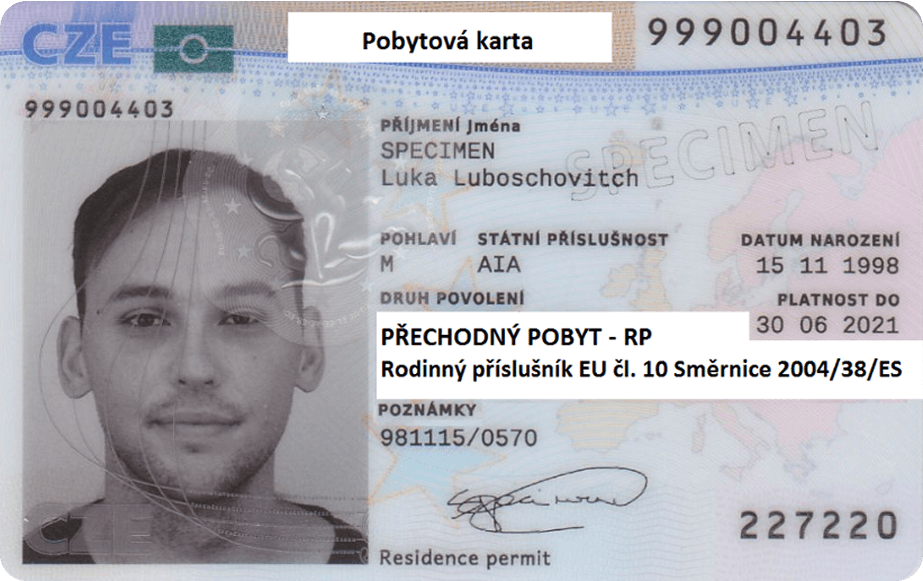Czech Partnership Visa For Partners Of EU Citizens
Need assistance obtaining Czech temporary residency as a Partner or Family Member of an EU Citizen? Learn how to apply for the Czech Partnership Visa today.
Temporary Residency for Family Members of EU Citizens
Often, foreigners call it the “Czech Partnership Visa”. However, officially, the “Czech Partnership Visa” is a Residence Permit for Family Members of EU Citizens. It is not technically a visa. Some call it a “visa” because partners can obtain the permit without marriage. It can also apply to same-sex couples, as long as the relationship status meets certain conditions.
The residence permit can be temporary or permanent, granting the holder certain rights under EU legislation. When granted, these rights provide freedom of movement and residence within the territory of the member states.
In the Czech Republic, the Ministry of Interior (MOI) processes applications for residence permits of family members of EU citizens. For the MOI to approve an application, the applicant must prove their relationship meets the requirements to issue the document. If granted, permit holders gain a number of advantages over standard types of visas for third-country nationals.
But who exactly is considered a family member of an EU citizen? How do you apply for the permit? Read on and we’ll help. See who’s eligible and how to apply for the “Czech Partnership Visa”, the residence permit for family members of EU citizens.
Who is considered a family member of an EU citizen?
To begin, the MOI grants the same opportunity for unmarried non-EU partners of EU citizens as it does for spouses of EU citizens. This is according to Immigration Law 326/1999/Sb. It states the conditions for obtaining residency as a family member of an EU citizen.
Family of EU citizens are husband, wife or civil partner, children, parents, grandparents, or any other family members specified by law. If the relationship is not through marriage or a civil partnership, applicants must prove a “durable” relationship.
How did Brexit change the “Czech partnership visa”?
Paragraph 15a and 15b extend the opportunity to partners of UK citizens who obtained temporary residency before Brexit. This grants them the same rights as a family member of an EU citizen in the Czech Republic.
Let’s look closer at the conditions to apply. MOI can grant residence to an applicant if any of the requirements is fulfilled:
Spouses or civil partners of an EU citizen, or of a UK citizen with temporary residence;
Children (under 21 years of age) of an EU citizen, or of a UK citizen with temporary residence;
Non-EU children of an EU citizen, or of a UK citizen with temporary residence;
Partner in a permanent relationship with an EU citizen, or with a UK citizen with permanent residency (paragraphs 15a, 15b);
UK passport holder without the status of EU withdrawal and which fulfills one of the above conditions.
Other recent updates and new requirements
If you’re applying for a partner visa or family member status in the Czech Republic, you now need to meet updated financial requirements. Since August 2, 2021, applicants must provide Proof of Funds to show they can afford living and housing expenses for the duration of their permit. The Ministry of the Interior (MOI) sets the minimum amount based on the residency type.
Income Requirements (From Czech Sources Only):
Stable Income: Either you or your partner must earn enough in the Czech Republic to cover rent and living costs..
Full-Time Employment: You must provide three recent salary slips from a job in the Czech Republic. A net monthly income of at least 40,000 CZK Gross is recommended.
Self-Employed (Trade License Holders): If you have a Živnostenský list (trade license), submit the income tax report for the previous tax year from the Czech Republic. Your net yearly income should be at least 600,000 CZK to cover living costs and taxes.
Combining Incomes: If both you and your partner have income from Czech sources, you can combine your earnings to meet the financial requirement
Another change relates to cases in which the applicant comes from countries that require a visa in the Czech Republic. In these cases, the non-EU partner must now obtain a short-term / entrance “partnership visa” from a Czech Embassy. Short-term visas from other Schengen countries are no longer acceptable.
Citizens of countries with a visa-free agreement do not need to obtain a short-term entrance visa. For example, if it’s somebody from the USA who has 90 days free travel in Schengen, a short-term visa is not required.
Finally, upgrading to permanent residency after 2 years as a partner of a Czech citizen is no longer possible. However, there is an exception for couples who married after obtaining the “family-member visa”. If they have been married for at least one year since the permit was issued, it’s still possible to upgrade the permit to permanent residence.
In all other cases, applicants can only apply for permanent residency after 5 years in the permanent relationship.
The partnership visa validation period was changed from 5 years to 3 years after the Czech immigration law changed on 2.8.2021.
Advantages to residency as a partner of an EU Citizen
What are the advantages to this “family-member visa”? First, when approved, residence holders have the same rights as EU or Czech citizens. They have free access to the Czech labor market. This means they can simply sign a contract and begin work, without needing employer sponsorship or an employee card.
Other advantages include the following:
-An EU Family Member Visa is valid for 3 years for partners.
-Exchange this permit for permanent residency after 5 years.
-There is no need to pass the Czech Language Exam for permanent residency.
-No need for MOI adaptation and integration courses, which are now mandatory for third-country nationals.
- Free access to the labor market. It means you can sign a contract and work without a working permit.
Married during the partner/partnership visa process?
A partner visa is valid for up to 3 years. If you get married while your partner visa application is being processed, you should update your file by sending your marriage certificate to the Immigration Office and requesting a change to "spouse" of an EU citizen.
This change can extend your stay to 5 years instead of just 3 years. Make sure to request this change before your visa application is approved, as you won’t be able to update your file after approval.
Where to Apply for a Partner Visa and Required Documents
You should apply for a partnership visa at the MOI office. Required documents:
Your passport
Your partner's passport
Comprehensive Health Insurance*
Proof of permanent relationship
Proof of income( salary slips or forms from the tax office)
2 ID size photos (3.5 cm x 4.5 cm)
Other supporting documents
If you’re applying for a Czech partner visa, please note that EHIC cards from other EU countries aren’t accepted. You’ll need to purchase Czech health insurance that covers the full period you want your visa to last.
A partner visa in the Czech Republic can be issued for up to three years, but the visa’s validity will match the length of your health insurance. For example:
If you buy insurance for one year, your partner visa will be valid for one year.
To ensure the visa’s full three-year validity, we recommend purchasing health insurance for three years.
Pexpats is a direct partner of insurance companies in the Czech Republic and offers corporate bonuses and discounts. Please feel free to contact us to arrange your health insurance for your partner visa.
During the application appointment, it is important to obtain a bridge visa as proof of the visa process activation. If the MOI employee does not activate your bridge visa and your Schengen visa expires, you will be staying illegally or considered an illegal foreigner, even if you have applied for a partner visa.
That is why it is important to request a bridge visa to double-check if your partner visa process is activated to avoid any problems.
Home Visit by Czech Foreign Police
As part of the process, the Czech Foreign Police will visit your apartment to verify that you and your partner actually live together. To avoid delays:
Provide a phone number
so they can contact you while they visit your building.
Make sure both names are on the doorbell/entrance
to help them locate your apartment easily
This step is important as it speeds up the verification process and approval of your Partner visa.
How to change Czech Partnership Visa for long-term residence
What happens to the Czech residency permit if the relationship ends, or the partnership visa is canceled? Obviously, it can happen. Couples break up. If the relationship ends, the residency permit also ends with it. In this case, the permit holder must inform MOI about the conclusion of the relationship.
However, when this happens, it is still possible to change your current status to long-term residency. To do this, applicants must take the following steps.
Announce the change in status to MOI.
MOI cancels the residency permit and provides a departure sticker.
A letter stating the cancellation of the permit from MOI arrives, at which point you have 60 days to appeal.
Make an appeal for long-term residency under Paragraph 87f. The purpose of stay will be long-term residency and can be based on employment, studies, or business. As taxes and contributions are the responsibility of the employer, the Purpose of stay employment is suggested for a positive outcome.
Note: the appeal process should never be skipped! This is the most common mistake applicants make. They try to both cancel their partnership visa and start the residency application at the same time.
This leads to MOI rejecting the application, as the applicant has no right to long-term residency without the partnership visa. It’s thus crucial to appeal (and have the 60 days of protection) to prevent becoming illegal during the process.
Have questions? Pexpats has answers!
Did this post answer all your questions? If not, don’t hesitate to reach out! We’re expats just like you, and we know the hassles of Czech bureaucracy all too well. We can help you navigate not only the partnership visa but also any odds and ends that may come up along the way. In fact, to date, we’ve arranged over 700 partnership visas, and we can help you do the same.


